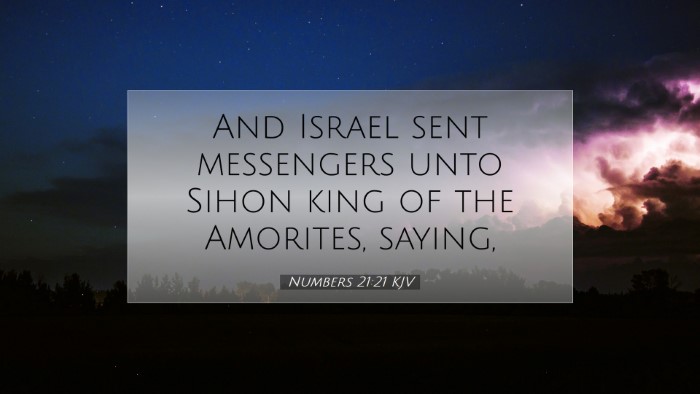Commentary on Numbers 21:21
Numbers 21:21 states: “And Israel sent messengers unto Sihon king of the Amorites.” This verse marks a significant moment in the journey of the Israelites as they sought passage through the land of the Amorites. To understand its implications, we can draw insights from several public domain commentaries.
Contextual Background
The Israelites, having journeyed through the wilderness, are now approaching the borders of the land of Canaan. This interaction with Sihon, the king of the Amorites, represents both a geographical and spiritual confrontation. The Amorites were one of the dominant tribes of that region, and Sihon’s response would determine the further course of Israel’s journey into the Promised Land.
Insights from Matthew Henry
Matthew Henry highlights the importance of diplomacy in this encounter, indicating that the Israelites were not a militaristically aggressive people but rather sought peace where possible. They sent messengers, a sign of their desire to negotiate terms rather than immediately resort to warfare.
- Negotiation Over Conflict: Henry points out that this act of sending messengers reflects a broader biblical principle: the pursuit of peace (Romans 12:18). Even in facing formidable foes, God's people are encouraged to first seek dialogue.
- The Nature of Sihon: Henry notes the character of Sihon and the Amorites. The king’s response would reveal not just the dynamics of power but also the moral implications of the conflict. This emphasizes the theme of divine justice and retribution that runs throughout Scripture.
Insights from Albert Barnes
Albert Barnes provides a theological lens through which to interpret this passage. He emphasizes that this moment serves a dual purpose: preparation for the Israelites and judgment upon the Amorites.
- Preparation for Conquest: Barnes notes that the negotiation served as a preparation for the eventual conquest of Canaan. God had promised the land to the descendants of Abraham, Isaac, and Jacob, and these encounters were part of the fulfillment of that promise.
- Divine Judgment: The refusal by Sihon to allow the Israelites passage was not just a political move, but an act of defiance against God’s purposes. Barnes underscores that Sihon’s rejection would lead to dire consequences, showing how nations rise and fall under divine sovereignty.
Insights from Adam Clarke
Adam Clarke offers a noted historical perspective regarding the Amorites and the implications for the Israelites. He explains that the Amorites were a tribal coalition that posed a significant threat to the Israelites.
- Historical Context: Clarke discusses the historical enmity between the Israelites and the Amorites, suggesting that Sihon’s response can be seen within a larger context of animosity and territorial disputes in the ancient Near East.
- Spiritual Warfare: He extends the interpretation to show that every physical battle reflects a spiritual reality. The encounter is not only about land but represents the ongoing conflict between the people of God and opposing forces.
Theological Implications
When examining Numbers 21:21, it becomes clear that the passage is rich in theological meaning. It reflects God’s providence and the necessity of faithfulness in the face of opposition.
- God’s Guidance: The act of sending messengers reflects a trust in God’s guidance. The Israelites, despite their fears and uncertainties, acted on God’s direction, demonstrating that faith often requires initiative.
- Lessons on Conflict: There are significant lessons on conflict resolution. The Israelites embody a posture of surrender to God’s will even when faced with powerful adversaries, teaching the importance of relying on divine wisdom in all matters.
Conclusion
Numbers 21:21 reveals the significance of negotiation and the attributes of both the people of Israel and their adversaries. Through the commentaries of Matthew Henry, Albert Barnes, and Adam Clarke, we glean insights on the deeper themes of divine providence, spiritual warfare, and the pursuit of peace. For theologians, pastors, and students of the Word, this passage serves as a reminder of the enduring principles that govern relationships and conflicts in a biblical context.


